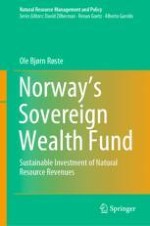2021 | OriginalPaper | Buchkapitel
7. A Sketch of an Evaluation
verfasst von : Ole Bjørn Røste
Erschienen in: Norway’s Sovereign Wealth Fund
Aktivieren Sie unsere intelligente Suche, um passende Fachinhalte oder Patente zu finden.
Wählen Sie Textabschnitte aus um mit Künstlicher Intelligenz passenden Patente zu finden. powered by
Markieren Sie Textabschnitte, um KI-gestützt weitere passende Inhalte zu finden. powered by
